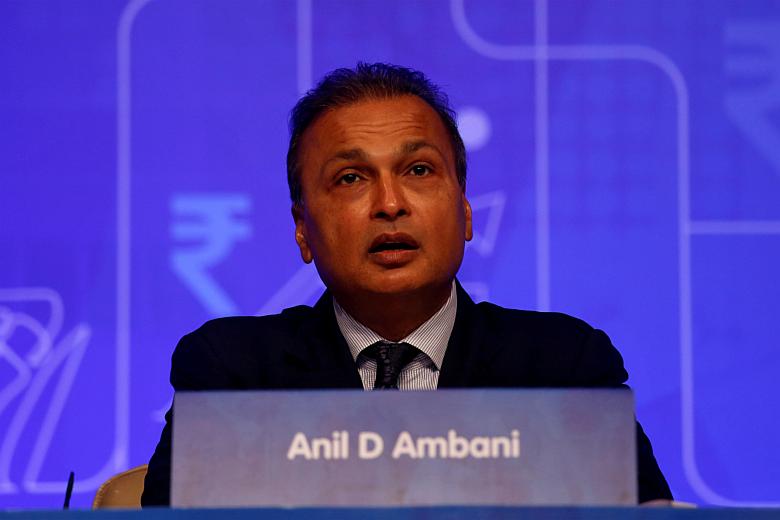The great Indian wealth churn: The rise of new billionaires and the fall of the old
Sign up now: Get insights on Asia's fast-moving developments

Anil Ambani inherited some of the newer businesses of Reliance Industries Ltd. in 2005, along with his older brother Mukesh, but he is now fending off creditors and fighting multiple cases in courts amid his phone carrier Reliance Communications Ltd.'s slide into bankruptcy.
PHOTO: REUTERS
BENGALURU (WASHINGTON POST) - India is going through one of the greatest periods of wealth creation - and destruction - all at the same time.
A new breed of self-made entrepreneurs is vaulting into the ranks of the wealthy, offsetting billions lost by debt-burdened industrialists and members of the country's old dynasties. The changes are set to help India's ultra-rich population grow at the world's fastest pace.
It's a shift shaped partly by a debt-fuelled expansion that left businesses from power generation to airlines with US$190 billion (S$259 billion) in soured loans. Over the past few years, Prime Minister Narendra Modi's government has cracked down on delinquent borrowers, and India's banks moved to seize their assets, a dramatic change for a country where the wealthy once enjoyed almost complete protection.
While old business clans continue to dominate India's rich lists, a tenfold expansion in its economy since its opening in the 1990s has spawned new tycoons in fields like technology.
The number of billionaires in India more than doubled to 119 between 2013 and 2018, according to Knight Frank.
And the country will lead the global growth in ultrahigh net worth individuals, with its numbers rising 39 per cent to 2,697 by 2023, the researcher estimates.
"The business environment has improved over the years," said Mr Charles Dhanaraj, a professor at the Fox School of Business at Temple University in Philadelphia. "The availability of venture capital and private equity has changed the opportunity space for promising businesses. So we should see more of these startups and scaleups in the coming years."
Here are some well-known names who have seen a shift in their fortunes:
OLD MONEY
Mr Anil Ambani, the younger brother of Asia's richest man, inherited some of the newer businesses of Reliance Industries Ltd. in 2005 as part of a settlement with older sibling, Mukesh, following the death of their father Dhirubhai Ambani three years earlier. Now, more than a decade later, the younger Ambani has been fending off creditors and fighting multiple cases in courts amid his phone carrier Reliance Communications Ltd.'s slide into bankruptcy. A representative for Anil Ambani didn't comment. The value of his holdings in companies has plunged to about US$120 million from a net worth of at least US$31 billion in 2008, according to the Bloomberg Billionaires Index.
- The first-generation entrepreneurs, Shashi and Ravi Ruia, started the Essar Group in 1969 as a construction company. Later they diversified into new businesses, investing about US$18 billion between 2008 and 2012. The excessive leverage across the group and some adverse policy actions forced them to sell many of their assets. The Ruia brothers were jointly worth more than US$4 billion at the start of 2015, and have since lost their billionaire status, according to the Bloomberg Billionaires Index.
- Mr Tulsi Tanti's Suzlon Energy Ltd purchased German REpower Systems for nearly US$2 billion in 2007 to be hailed as a global company, but things went downhill from there. Once the world's top turbine maker, Suzlon's debt-driven expansion caused one of India's largest corporate debt default in 2012. Seven years later Mr Tanti is struggling to repair his company's finances. Mr Tanti, who had a net worth of more than US$5.7 billion in 2007, has lost his billionaire status, according to data compiled by Bloomberg.
- After inheriting his father's liquor empire, Vijay Mallya, started Kingfisher Airlines Ltd. Struggling to repay lenders, the carrier was grounded seven years later. Mallya is currently fighting an extradition case in London after fleeing India. Lenders have sought to recover as much as US$1.5 billion from the man known as "the king of good times" for his flamboyant lifestyle.
NEW MONEY
- Mr Binny Bansal and Mr Sachin Bansal, who aren't related, created Flipkart, India's largest online retailer, within a decade. Last year, they sold their company to Walmart, becoming billionaires. Mr Binny Bansal left shortly after, with Walmart said to have conducted an inquiry into a consensual relationship he had with a woman. He still holds 4 per cent of Flipkart and a board seat. Mr Sachin Bansal exited Flipkart at the time of the Walmart acquisition.
- Mr Vijay Shekhar Sharma founded One97 Communications in 2000 when fewer than 10 million Indians were online. Business at his Paytm digital payment unit soared after the Indian government eliminated 500- and 1,000-rupee banknotes at the end of 2016. An August 2018 funding round valued One97 at more than US$10 billion, people familiar with the matter said at the time. Mr Sharma currently owns 15 percent of the company, according to a person familiar with the matter.
- Mr Byju Raveendran, chief executive of Bangalore-based Think & Learn Pvt, launched the Byju's K-12 education app in 2015. His videos explain fractions or the laws of motion at a conceptual level, drawing almost 30 million users from 1,700 Indian cities. A December funding round valued it at US$3.6 billion. Raveendran, his wife and brother together own about 36 per cent, according to Mr Raveendran.


